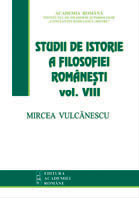Mircea Vulcănescu şi satul românesc interbelic
Mircea Vulcănescu and the Romanian interwar village
Author(s): Ionuţ ButoiSubject(s): Social Sciences
Published by: Editura Academiei Române
Keywords: Household; peasant; village; monograph; social capital; agrarianism; neoliberalism
Summary/Abstract: This article proposes a detailed analysis of the contribution brought by Mircea Vulcanescu, within the Gustian School, to the research of the economic dimension of the Romanian village. To the profitability of the peasant family’s budgets, method used by prominent agronomists of the time to study peasant economy, Vulcanescu opposes a nuanced approach emphasizing the subjective economic judgment of the peasant, inspired by the research of the Russian economist Ceajanov. The method Vulcanescu proposes is part of a perspective where the household is considered the cornerstone of a homely-peasant economy, systemically different from the capitalist economy. Socio-economic problem of small farms/households represents a key part of the interwar debate on the way forward for Greater Romania: either the agrarian way or the industrial-bourgeois path. The Romanian village, for Vulcanescu and other monographists, was not just a special economic reality; it was considered as a social world in itself, radically different from the social world of the interwar Romanian cities. The whole discussion seems, at first sight, of purely historical interest; however, recent research on the importance of social capital and governance of common property shows that ignoring the special socio-economic character of the Romanian village ruined not only the quality of academic debate on the subject but the society as a whole.
Journal: Studii de istorie a filosofiei româneşti
- Issue Year: VIII/2012
- Issue No: 08
- Page Range: 196-229
- Page Count: 34
- Language: Romanian

